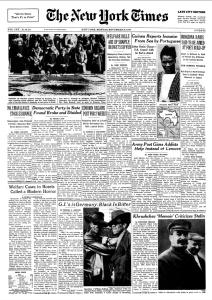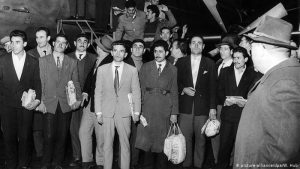SIYAH: Black American Servicemen and Turkish Workers in West Germany: Two Cultural Responses to Prejudice and Discrimination
This is the twelfth instalment in ‘Siyah’ which explores the relationship between the African Diaspora and Turkish social and cultural narratives, with journalist Adama Juldeh Munu. In 1973, the sociologist Peter T. Suzuki produced a comparative analysis of the cultural responses of African-American Government Issue (GI) servicemen and Turkish workers in what was then known as West Germany. Black GIs were a part of the cohort of soldiers in the Western/Allied Forces’ protectorate of West Germany, following the end of World War Two. The following is a summary of Suzuki’s analysis on Black Americans and Turks navigating racism in West Germany.

Black American GIs and Turkish workers were two separate groups in West Germany. However, they were bound in the following ways. Firstly, they were both guests – one group supported the economy and the other group helped defend the nation. Secondly, both groups faced prejudice and discrimination. What distinguished them, however, was how they coped with this. Suzuki mentions that the young GIs used a process called dissimulation, while Turks used dissimilation – mechanisms that reflected aspects of African-American culture and rural Turkish society, respectively.
The grievances of the servicemen in Germany are well documented. Some of these included discrimination in housing; restricted admission to beer halls and clubs; German dislike and distrust of Black people; harassment in the Armed Forces; and unequal opportunity in an organization that professed otherwise.
For most Americans it came as a shock, in the fall of 1970, to learn through mass media that for a large segment of America’s fighting forces, the major battle lines drawn were not in the thickets and swamps of Indochina (Cambodia, Laos, Myanmar, Thailand and Vietnam) but in the cities and towns of West Germany; that the enemy was not “Charlie”, but “Heinz”; and that the main target was not the interdiction of the Ho Chi Minh Trail but the restriction at Hauptstrasse.
Suzuki states: “The irony of the situation in Germany is brought home sharply to the Black GIs and their families who cannot find adequate housing or cannot freely enter a place of recreation on account of social prejudice and discrimination practiced against them by the very people these warriors are here to defend. And these GIs are convinced that the US Armed Forces, or NATO, can readily enforce fair housing rules on German landlords and slumlords or minimize German prejudice and discrimination; but to date, the pronouncements and measures taken by the Command have been palliatives rather than real ones.”
Embittered by the failure of the Armed Forces to take strong measures and genuine steps to combat and alleviate prejudice, harassment, and discrimination, he found young Black GIs were using dissimulation to come to grips with the unfavourable situations within the military community and German society.
Dissimulation is described as “participatory withdrawal from…imposed military or civil societal norms.” That is to say, GIs would avoid confrontation with society or segments of it. Suzuki observed that the young servicemen would merely go through the motions of conforming and focusing on being the ideal soldier or airman. For instance, in performing their duties, patriotism, proper dress, and deferential behaviour and language, to list only a few.
But they participated in the system while keeping some elements of their identity. They did this by staying barely within the letter of the law and the bounds of propriety as established by military and West German society, and in a calculated way taunting the military with their power checks, daps, liberation handshakes, Afros, embellishments on their uniform and rap sessions. In doing so, they flouted authority, and German societal norms.
He notes that dissimulation has a long past, and, until the Black Power Movement, was deeply rooted among young Black GIs in the form described in this report as a continuation of a cultural tradition equally constrained by prejudice and discrimination. As part of the Black Power Movement, dissimulation helped nudge the Armed Forces into making change.

He goes on to say that the bureaucracy and the officers were so successfully socialized to the Apparat, that they failed to comprehend what was going on or at the very least responded with bemused tolerance.
Turks, whose numbers swelled from 2,700 in 1960 to over 700,000 in 1972, were also significant element of West Germany’s new foreign workers (Gastarbeiter; literally “guest workers”) that came primarily from the Mediterranean area. All these labourers also became a new pariah for prejudice and discrimination following World War Two. Turks were the least assimilated as they lived primarily in segregated housing units and ghettos; and German stereotypes, prejudice, and discrimination meant they were the most disadvantaged in comparison to other Gastarbeiter.

“My findings, in working with a small group of Turks, show that these Muslim labourers have many characteristics concordant with the Protestant: asceticism, frugality, self-denial and self-sacrifice, and disdain for immediate gratification are pervasive features of their lives.” He continues: “Why then is there such a gulf between Turks and Germans? In spite of their genuine wish to be accepted by Germans – on their own terms – and their admiration for Germans, I found that these Turks emphasize a deliberate separation of their lives from their hosts because they are sensitive to prejudice and discrimination and, more significantly, because they are fearful that German values would vitiate and attenuate theirs.”
In other words, Turkish workers underwent a process of (cultural) dissimilation – the emphasis on distinctiveness from others when their identity is under threat. They achieved this through interacting and living exclusively among themselves, despite other alternatives; prolonged separation from their families, wives, and children; indifference toward learning German; idealization of their homeland; and a conscious effort to perpetuate their values.
Suzuki goes on to say: “Dissimilation, nevertheless, is a positive effect of their cultural heritage. They do not wish to be anything but Turks, and… assimilation, they realize, would force them to cede their cherished notions about pride, patriotism, morality, and identity to Germans and Germany…” The marked feeling of solidarity found among Turkish workers who come mainly from rural Anatolia accounts for this dissimilation.
“This feeling of solidarity rests not only on their being the most alien group among all foreign workers in Germany, owing to their religion, language, and Middle Eastern-Ottoman cultural background, which, reciprocally, estrange Turks even more from Germans, but rests also on a social reality and artifact of rural Turkish society.” Social solidarity is a basic component of that society from Ottoman and early Republican Turkey, based on the philosophy fostered by Mustafa Kemaln Atatürk (“Father of Turks”) that all Turks are indeed brothers under the skin, thanks to common ethnicity, language, heritage, and culture.
As shown, Black GIs and Turkish workers were two migrant groups in West Germany there to defend the new post-World War Two autonomous state and to help build its economy. However, they each faced a consortium of discriminatory practices, both within the institutions that served as their patrons and wider society. Black American GIs used dissimulation to survive poor treatment in their posts, which was a mixture of conforming to what was expected of an ‘ideal soldier’ or ‘blending in’ and yet utilizing their own distinct backgrounds as a form of passive resistance. The context of this was of course similar to conditions they experienced within the United States. Dissimilation was an aspect of African-American resistance against Jim Crow laws in the US too, and it is surprising that this is not included in Suzuki’s analysis.
For Turkish workers, Suzuki states that they specifically underwent a process of dissimilation, which was perhaps brought about due to the long-standing German stereotypes that existed about Turks, thus Turkish workers were one of the more badly treated group of guest workers. The act of dissimilation was achieved through interacting and living exclusively among themselves. The marked feeling of solidarity and not ceding to the idea of ‘German superiority’ is described by Suzuki to have come from Ottoman ideals and those associated with the early Turkish Republic under Mustafa Kemal Atatürk.
You can check out the rest of the Siyah series here: https://afropean.com/?s=siyah


